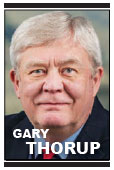By Gary R. Thorup
The Utah Legislature concluded its annual general session on March 14. The Legislature adjourned an hour early, but the session was action-packed and record-breaking. In all, the Legislature passed 574 bills and resolutions, beating the previous record of 535.{mprestriction ids="1,3"}
Prior to the 2019 general session, the Legislature convened in a special session to deal with Proposition No. 2, the citizen initiative dealing with the legalization of medical marijuana. When the session commenced, it appeared the Legislature would also modify the statutory language enacted in Proposition No. 3 (Medicaid expansion) and Proposition No. 4 (creation of a redistricting commission). The Legislature did spend the first few weeks of the session modifying the language of Proposition No. 3, but did nothing with Proposition No. 4. Proposition No. 3 was modified through passage of the fourth substitute of SB96. Through this legislation, the Legislature intends to accomplish the same result as intended by the organizers of Proposition No. 3, but in a less expensive manner. Particularly, the Legislature hopes to obtain waivers from the federal government to allow Utah to cover persons at a different poverty level than generally allowed by the federal government. If the waivers are granted, Utah will receive 90-10 federal-to-state matching dollars rather than the 70-30 match typically allowed at the poverty level adopted in the bill. If the waivers are not granted, the bill provides that the language would essentially revert back to the language adopted by the people at the ballot.
Prior to the session, the Governor’s Budget Office, the Legislature’s Fiscal Analyst Office and the Tax Commission were all projecting a $1.3 billion surplus. In the governor’s State of the State address, he announced he was requesting the Legislature appropriate significant additional dollars to public education and $100 million on clean air initiatives, that he wanted the Legislature to enact significant tax reform/modernization to “fix” an imbalance in the sources of state revenue and to modernize Utah’s sales and use tax laws to reflect the fact that Utah’s economy has moved from a goods-based economy to a service-based economy and provide a significant tax cut to Utah citizens.
Later in the session, revenue projections were revised down to $1.1 billion. The concern about the “imbalance” in the revenue sources was confirmed when it was revealed that $900 million of the $1.1 billion surplus came from income taxes that are constitutionally dedicated to fund public and higher education. Most other state programs are funded out of the general fund that is largely derived from the sales and use tax.
In the governor’s address, he stated that Utah’s sales tax revenues were no longer keeping pace with the needs of the state because Utah’s laws do not tax many of the services that were previously taxed as goods. The governor offered the example that most Utah households used to purchase a lawnmower to mow their own lawn. Sales tax was collected on the purchase of those mowers. Now, many people use a lawn-care service so the state receives sales tax revenue only on the mower purchased by the provider of the lawn care service — a service that is not currently taxed. The governor stated that if the Legislature were to tax all services, the state’s 4.70 percent sales and use tax rate could be reduced to 1.75 percent.
House and Senate leadership appeared unified in their support of the governor’s request for tax reform/modernization. However, the drafting of such a monumental piece of legislation took much longer than was expected and legislation to implement this aspiration — HB441, Tax Equalization and Reduction Act — was not publicly released until Feb. 27, the 30th day of the 45-calendar-day session, and had its first public hearing on March 1. After receiving and considering concerns raised by many interested parties — individuals, businesses and local government — legislative leadership decided that there was insufficient time to deal with a complicated tax reform/modernization bill during the session and decided to pull the plug on HB441 on March 7.
The Legislature and governor are not giving up on enacting tax reform/modernization legislation. Before adjourning, the Legislature did enact HB495, Tax Restructuring and Equalization Task Force. HB495 creates a study task force comprised of 10 legislators and four additional nonvoting members who have expertise in tax matters to study and recommend how to deal with “structural imbalances among revenue sources.” The next four months will be important since the task force is required to report its findings and recommendations to the Legislature by Aug. 1.
Other “tax and business” legislation of interest that passed includes SB33 (Oppressive Conduct in a Closely Held Corporation), SB145 (Legal Notice Revisions), 3rd Sub. SB168 (Sales and Use Tax Revisions), 2nd Sub. SB121 (Controlled Business in Title Insurance Repeal), 1st Sub. HB231 (Tangible Personal Property Revisions), and 2nd Sub. HB378 (Regulatory Sandbox).
Gary R. Thorup is a shareholder at the law firm Durham Jones & Pinegar in Salt Lake City. He has practiced state and local tax law and has lobbied the Utah Legislature on a variety of tax and non-tax issues for more than 35 years.{/mprestriction}








